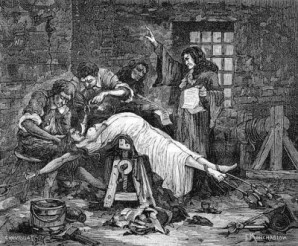 “The world will not be destroyed by those doing evil, but by those who watch them without doing anything.”—Albert Einstein.
“The world will not be destroyed by those doing evil, but by those who watch them without doing anything.”—Albert Einstein.
The Perugian officials say Amanda lied, but is it really a lie when another person does your talking for you?
Is Amanda really a liar because the police used a sentence from an interrogative technique called a “Visualization,” a visualization that they demanded from her while she was alone and terrified, cut off from any help. A visualization that SHE never considered to be true and tried to tell the police that fact less than an hour after they compelled her to say the sentence in question. When a vulnerable person is yelled at and slapped by a dozen police officers, when police want that person to say something in a certain way, when that person does not understand the language spoken, what should that vulnerable person do? How many reading this could really hold their own in such a situation? Most of us are not trained to withstand abusive interrogative techniques and the police use that to their advantage, they also know that certain segments of the population are more vulnerable to police coercion than others.
Amanda Knox and Raffaele Sollecito were in one of those groups, “Under 25,” when they were interrogated November 5-6, 2007.
So, is Amanda really a liar because she was coerced and, as a result, complied with what the police ordered her to do? Or are the police liars for using a sentence they know to be false? A young woman’s life is forever changed because of one sentence.
Words can hurt you.
In Italy there are Crimes Against Honor, as outlined in the Italian Penal Code Articles 594 to 599, they specifically restrict one person from defaming another by speaking (slander) or writing (libel), the laws include the use of the media for the purpose of vilification. These crimes are punishable by fees and/or prison time with three years being a maximum sentence. Amanda had already served four years in prison for an overturned murder conviction and so was released with timed served for the slander charge brought against her by Diya “Patrick” Lumumba, her former employer.
Slander is a very serious crime in Italy and lawsuits are very common, so it is not unusual that Amanda Knox and her parents are victims of this type of legal action. There are three slander suits against them, two against Amanda by her former boss, Lumumba, and eight Perugian police officers. And one against Amanda’s parents, Edda Mellas and Curt Knox, by the eight police officers because they repeated Amanda’s account of the interrogation to the London Sunday Times in 2008.
It is the slander charge brought by Lumumba that is being discussed as a crime against him by Amanda. The defense maintains that the so-called slander was the result of an interrogation in which the police were pressuring Amanda to name Lumumba as the person who murdered Meredith Kercher, Amanda’s roommate. The Hellmann-Zanetti Report, conclusions from the murder appeal, concurs.
“In that context, it is understandable that Amanda Knox, yielding to pressure and fatigue, would have hoped to put an end to that situation by giving her interrogators that which, in the end, they wanted to hear: a name, a murderer.”
But it is important for the public to see this particular slander charge in context, so we must go back to the tragic day that Meredith Kercher’s lifeless body was found in the apartment that she shared with Amanda.
Very early into the investigation police focus was on a black man; African hairs had been found in Meredith’s hand, or so they thought at the time. The common belief was that this brave young woman had valiantly fought for her life and managed to get a piece of her attacker, that even from the grave she wanted the right person to pay for the crime against her. Those “hairs” turned out to be sweater fibers.

Ironically a black man did kill Meredith Kercher, but it was not Patrick Lumumba. All of DNA evidence on Meredith’s body and in her bedroom (the murder scene) belonged to Rudy Guede, a local thief.
But the Perugian officials ignored Meredith Kercher and the evidence. This complete lack of concern for her grieving family and the wholesale abuse of her friends have left Amanda Knox’s entire community seething with righteous anger on Meredith’s behalf. But I digress.
Amanda worked for Patrick Lumumba who is, conveniently for the Perugian investigators, African. Lumumba owned Le Chic, a nightclub, and employed Amanda to attract customers. She handed out leaflets in the piazza and chatted up clients in the bar. There has also been a great deal of speculation that Lumumba was targeted by the police for “selling drugs” on business premises and so was already under surveillance.
In a case of Two Birds with One Stone, and in hindsight clear prejudice against Amanda AND Patrick, it is readily apparent that the Perugian officials were determined to jail the young woman using any means necessary, including framing Lumumba for murder and then using him to file a slander suit against Amanda. Lumumba was a means to an end, Amanda was the focus of Perugia’s then Public Prosecutor, Giuliano Mignini, who accused Amanda to a crime she did not commit nor was a part of in any way. He needed to trap her in the judicial system before her mother arrived in Perugia; scant hours after her arrest. He used whatever and whomever was at hand.

Lumumba, for his part, had an airtight alibi the entire time he was in custody and three weeks after Meredith’s murder (November 21, 2007) he was released from custody and “replaced” by Rudy Guede whose fingerprints and DNA proved his complicity. Had Guede not been apprehended, it’s likely that Lumumba would still be in prison, his alibi ignored just like Amanda and Raffaele’s.
One week after the murder, BEFORE any evidentiary reviews came back, Amanda and her friend, Raffaele Sollecito, were interrogated by the police. Mignini, and the head of the Scientific Police, Edgardo Giobbi, managed the dual interrogations assisted by a dozen police officers, including the Chief of Homicide, Monica Napoleoni.
The interrogation was terrifying and grueling for both of these innocent students; neither had a lawyer and Amanda had no accredited interpreter as defined by international law.
Amanda barely spoke Italian. She certainly did not speak it well enough to understand Italian legalese.
Amanda reported afterwards that she was slapped in the back of the head twice” by a “brown-haired female officer” who yelled that the slap would help Amanda “remember.” During the hours of mental and physical abuse, the police began to focus on a text message between Amanda and Lumumba that read in part, “See you later.”
The police took this harmless Americanism for good-bye and twisted it into meaning; “I’ll see you later to kill Meredith.”
Silly, I know, but that is the truth of the matter and it has been spun that Italians don’t “understand” the meaning of “see you later.” I find that hard to believe because using Google Translate “see you later” becomes “arrivederci” and that translates back to simply “bye.” There is no possible way that this simple phrase can be misconstrued to mean, “Let’s kill someone later.” The leap from ‘goodbye’ to ‘murder’ is the width of the Grand Canyon and it represents one of many insane actions taken by police to excuse why they arrested and tortured innocent people.
It’s also important to note that the police purposely left out the last part of the text message “Good evening” which definitely means “goodbye” in the Italian culture, but this was ignored and only the first part of the message was used to spin the story that Amanda and Patrick had made an appointment for the evening of the murder.
The actual and really real truth is that the texting between Amanda and Patrick was simply that he didn’t need her at work that night, so she said, “I’ll see you later. Good evening,” and turned off her cellphone so that she and Raffaele would not be disturbed if Patrick changed his mind. The police used the purposely garbled text message and the turning off of cellphones as an assumption of guilt. Raffaele had also turned his off that evening for the very same reason, privacy.
Imagine that, two 20-somethings not wanting to be disturbed while they ate, drank and made merry. What is the world coming to?
The police wanted to know why Amanda “met Lumumba” and she kept saying that she hadn’t, then the police lied to her and told her that Patrick had actually killed Meredith and also that there was evidence that she was at the scene. They told her that she was “traumatized” and had forgotten that she was present when Meredith was murdered, despite her denials. This is when the female cop slapped her in the head to help her “remember.” They verbally abused calling her “Stupid liar” and derogatory names.

When Amanda was softened up, confused and terrified, the interrogators then introduced a technique called “Visualization” in which they ask a subject to IMAGINE what would be happening in a given situation. It is used specifically to see if a subject would give up any information that only a guilty party would know. The Perugians asked Amanda to visualize “If you were at the cottage while Lumumba was murdering Meredith, what would you be doing?” She replied, “I would be in the kitchen with my ears covered to block out the screams.” The meaning of her visualization is obvious; she would not participate in such a heinous act and would be cowering terrified in the kitchen.
But at that very moment the interrogation ended and the media spin began.
Amanda had unknowingly just supplied the police with a “murder suspect,” Lumumba, and “placed” herself at the scene. She thought that she had complied with their request so that they would stop yelling at her, she had no idea that they would use the visualization to spin a false story, arrest her, Raffaele and Patrick or charge them with murder. She thought she was helping with the investigation by doing what they demanded.
Within a few hours Amanda would be forced to sign two confessions in Italian, a language she could barely understand much less read. The police called these “Spontaneous Statements” meaning that Amanda had given them “freely and of her own will.” In them, she would find out later, the police had used the visualization as if it were an actual event and charged her with collaboration in Meredith’s murder.
The whole scenario was completely false, but the police didn’t care.
Amanda recanted within an hour, once she understood that police were going after Patrick. She was clearly upset that that she might have sent the police on a wild goose chase and wanted them to understand that she had only complied with the police wanting a visualization and that she had no involvement in the murder itself. She was not even sure about Lumumba’s participation, having no knowledge of it other that what the police had told her. She explained in a rambling ‘note,’ commonly know as the “Memoriale,” that she confused by what had just happened (meaning the interrogation) and states, “All I know is that I didn’t kill Meredith…”
In fact, Amanda did not know that she was being charged with murder until a few days after her arrest, clearly showing that she did not understand what was going on around her.
The Hellmann-Zanetti Report also states,
“This Court therefore finds that Amanda Knox had indicated Lumumba as the perpetrator only because, at that moment, it appeared to be the quickest and easiest way to put an end to the situation in which she found herself, her interrogators having insisted on an explanation of the message she sent to him. It follows from this that, with regard to the murder, not only may the “spontaneous” statements not be used, but in reality neither may the note written later, since, although usable from a procedural standpoint, it does not deserve to be relied upon from a substantive one, as it does not represent what really happened in this case.”
This Memoriale is a compelling illustration and heartbreaking insight into Amanda’s confusion and extreme mental distress, a normal state of mind for someone who had just endured an interrogation. When applied to a very young and innocent person, it is also a glaring example of the abuse that Amanda, Raffaele and Patrick endured at the hands of the police.
In another irony Patrick Lumumba also slandered the police, after his release, when he told Antonia Hoyle of Britain’s Daily Mail in November 2007 that

“They were wearing normal clothes (meaning the police) and carrying guns,” he says. “I thought it must be some sort of armed gang about to kill me. I was terrified. They hit me over the head and yelled ‘dirty black’. Then they put handcuffs on me and shoved me out of the door, as Aleksandra pulled Davide away, screaming.” He was greeted outside by a convoy of seven police cars, sirens blazing, and driven to Perugia’s police station, where he was subjected to a ten-hour interrogation. “I was questioned by five men and women, some of whom punched and kicked me,” he claims. “They forced me on my knees against the wall and said I should be in America where I would be given the electric chair for my crime. All they kept saying was, ‘You did it, you did it.’”
The entire article is full of slanderous lies told to the Mail by Lumumba about Amanda’s personality, none of which are true, and even includes references to the Foxy Knoxy character, a trademark of the Daily Mail’s early articles on the case. The title is even a lie: “I fired Foxy Knoxy for hitting on customers: Patrick Lumumba reveals why he was framed over Meredith’s murder.” Lumumba never “fired” Amanda; they mutually agreed that she was too afraid to work at night. In fact, Lumumba was very concerned about Amanda, in the aftermath of the murder, until the police falsely arrested him and lied about her involvement.
Then in September 2011, during the murder appeal, Lumumba’s own lawyer, Carlo Pacelli, continued the slander when he called Amanda a “demonic, satanic, diabolical she-devil, which leads her toward borderline behavior.” This lawyer has no right to psychoanalyze anyone, must less a defendant in a trial he is involved in, which is incredibly unprofessional and vicious behavior.
Lumumba was 38 years old at the time of his arrest and had been in Italy for 15 years, plus he was a business owner in Perugia. What amazes me the most is that Lumumba would have been aware of police brutality in general, being raised in the war-torn Congo, and of the Perugian public minister’s crusade to find a Satanist in particular. It’s not out of the realm of possibility, given his status and age, that Lumumba himself gossiped about Mignini with others.
Perugian residents are acutely aware of Prosecutor Mignini’s penchant for arresting people on false pretenses, something that had played out repeatedly in the fifteen years prior to Meredith’s murder. In fact, at the time of her death he was enmeshed in a second Monster of Florence trial, but the pharmacist he had charged with being Il Mostro was eventually found innocent. The Monster of Florence is a famous serial killer and the case is unsolved, the PM is infamous for digging up a body claiming it had been switched by Satanists. The body in the grave was the person who was supposed to be there and the episode traumatized the dead man’s family. Lumumba would be aware of the whole debacle and would most certainly have an opinion about Prosecutor Mignini.
Lumumba would also certainly know that the police had also brutalized Amanda and that she, barely out of her teens, would be no match for the tactics that were commonly used on Mafiosi, (and used on him) but he never expressed concern for her well being or outrage at the police for mistreating her and falsely arresting him.
Instead he hopped on the Smear Campaign bandwagon as soon as he was released.

I can understand that he would be afraid for himself and his family and also for the initial anger about being falsely accused, but I often wonder if his story would change were he safe from repercussions by the public minister and police. Both he and Amanda spoke publicly of their abuse during the interrogations, so why else would Lumumba be spared from a slander suit by the police when Amanda was not?
The rational line of thought is that Lumumba cooperated with the police to avoid prison and protect his family. The not-so-rational line of thought is that he is so hateful and blinded by anger that he will do anything to exact revenge on Amanda. The reports of Lumumba’s “gentle and friendly” personality lead me to believe that the true answer is his fear of the Perugian officials. While I appreciate his apprehension, I take serious offense that he seems to be enjoying his “victim” role far too much and that also goes for his attorney. But I temper my anger with the fact that he may well be in fear of his life, who could blame the poor man if that really is the case?
I hope one day he will forgive Amanda, she certainly is sad that she played a role in his suffering, but both need to remember who the real villains are and these are the people that Lumumba should be suing for slander, the Perugian officials.
The slander suits brought by the police against Amanda and her parents will play out in the next few years, but we must always remember that they are the result of the illegal interrogation. She was charged with slander for telling her parents what happened during the grilling and her parents were charged with slander for repeating her story to the London Sunday Times in 2008, they were unaware that they could be charged for telling the media the truth about what had happened to their daughter.
The article was written by John Follian, a UK journalist, and it’s interesting to note that he was often seen in the company of Mignini whenever he was in Perugia, so it was not surprising to the defense that his articles and book were pro-prosecution. What is a concern, knowing of his close affiliation with Mignini, is that his 2008 article was used as evidence in the slander charge against Curt Knox and Edda Mellas, Amanda’s parents.
That in itself makes one wonder if there was some collusion between Follian and Mignini before the article was published to ensnare Amanda’s parents or if Mignini took note of the article independently and used it for his own benefit. Of course this is conjecture on my part, but as I piece together this confusing case that coincidence repeatedly comes back to me, so it’s natural to wonder if my friends were targeted. The copy of the article used as a source here is in the Friends Of Amanda archives, the original article itself was removed from the internet shortly after the slander charges were handed down; another interesting coincidence.

So, in all three slander cases Amanda was called a liar. But when you look closely at their behavior, much of what the police said about her fits their own legal description of Slander, including the fact that the police and the Public Minister defamed Amanda in the media many, many times.
7 November 2007, Chief of Police Arturo De Felice said during a press conference that “Ms. Kercher may have been made to have sex by her killers. This was probably a sexually motivated killing.” This statement implies that Amanda, Raffaele and Patrick are all rapists, it is false.
9 November 2007, Judge Claudia Matteini, in her reconstruction of the incident said, “Ms. Knox, who worked for Mr. Lumumba at his Perugia bar, let the two men into the apartment with her keys. Then something went wrong. The two (men) demanded some kind of sexual act, which (Kercher) refused to do. She was then threatened with a knife, which Sollecito always carried with him, and with which Meredith was stabbed in the neck.” This is the basis for the crime theory and is forensically unprovable, not to mention complete conjecture.
December 1, 2007, Investigator Edgardo Giobbi, head of the Scientific Police in Rome said, “Kercher may have accused her flatmate Amanda Knox of stealing 250 Euros from her. That accusation, which Kercher possibly made in front of Rudy Guede, sparked a row.” Amanda had plenty of money and did not need Meredith’s, this is another defaming statement. Giobbi also said that he “didn’t need evidence” he could tell she was a murderer by the “way she acted.” He testified in the Trial of First Instance, “As she put them (crime scene booties) on she swiveled her hips, pulled a face and said ‘hop la’ – I thought it was very unusual behavior and my suspicions against her were raised.” It’s appalling that a seasoned police officer would use a silly juvenile act to defame an innocent person. Please also note that it was Giobbi who helped Mignini manage the illegal interrogations of Amanda and Raffaele. Then he would later brag that he was the person who instigated the interrogations, as well as, hearing Amanda “scream” while she was being abused.
18 January 2009 Giuliano Mignini said, “Knox, whom Guede was always trying to please, probably pushed him into ‘softening up’ the English girl and preparing her for the erotic ‘game’ while Knox ‘dedicated’ herself to Sollecito. When Guede failed because of energetic resistance by the victim, the three became incensed and violent. They grabbed Kercher by the neck and tried to strangle her. Sollecito grabbed her violently in the back and on a breast, deforming her bra clasp and then they finished her off with the violent knife stab to the left part of the neck. Kercher gave a last desperate scream, which was heard by (a neighbor).” Not only is this “theory” conjecture, but also pornographic in nature from a public official who is often of the author of sexually oriented crime scene theories.
Mignini went on, “A minute after the last stab wound, the three allegedly fled the cottage, with Knox and Sollecito returning later to stage a fake robbery by breaking a window.” Mignini also expressed emphasis of “placing of a duvet over Kercher’s body as extremely important from a psychological point of view. It indicated pity and respect for the victim. Amanda, especially as a woman, couldn’t bear that naked, torn female cadaver.” Again and again, Mignini creates thought processes and dialog for Amanda and Meredith; he has no proof for anything, other that what is conjured in his own filthy mind, so this, in fact, constitutes slander.
28 February 2009, Officer Domenico Giacinto Profazio, the former head of the city’s Flying Squad, testified that other officers “told me that she did the splits and a cartwheel in one of the rooms at the station – then later, after she had been questioned all night, she burst into tears,” in reference to 5 November 2007, the night of the illegal interrogation. Of course, Profazio forgets to mention that an officer was involved in asking Amanda to demonstrate the splits, that she never did cartwheels and that the tears were an emotional response from a vicious interrogation, not just random tears happening for no reason whatsoever.
Throughout this judicial debacle I saw example after example of the Perugian officials using the media to slander and libel Amanda Knox, Raffaele Sollecito and Patrick Lumumba. I find it incredibly ironic that they would charge Amanda, in particular, with slander, but many Italians say that it is as common in Italy as folks in the US suing McDonald’s for spilling hot coffee in their laps.
So to many here in Seattle, Amanda’s hometown and also home to the people who know her best, the slander charges are a complete joke. We hope that the higher courts in Italy will see through the veil of outrageous lies and defamation leveled at an innocent young woman in order to please a public minister. We hope the court someday metes out the appropriate response to the parties guilty of slandering Amanda, Raffaele and Patrick. And we hope that Patrick will someday drop his lawsuit against Amanda.
But mostly we hope that the general public will see these slander suits for what they are, one more distraction to cover up the Injustice in Perugia.
 Wrongful Conviction News an Injustice anywhere website
Wrongful Conviction News an Injustice anywhere website
